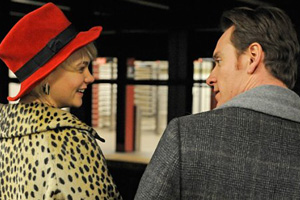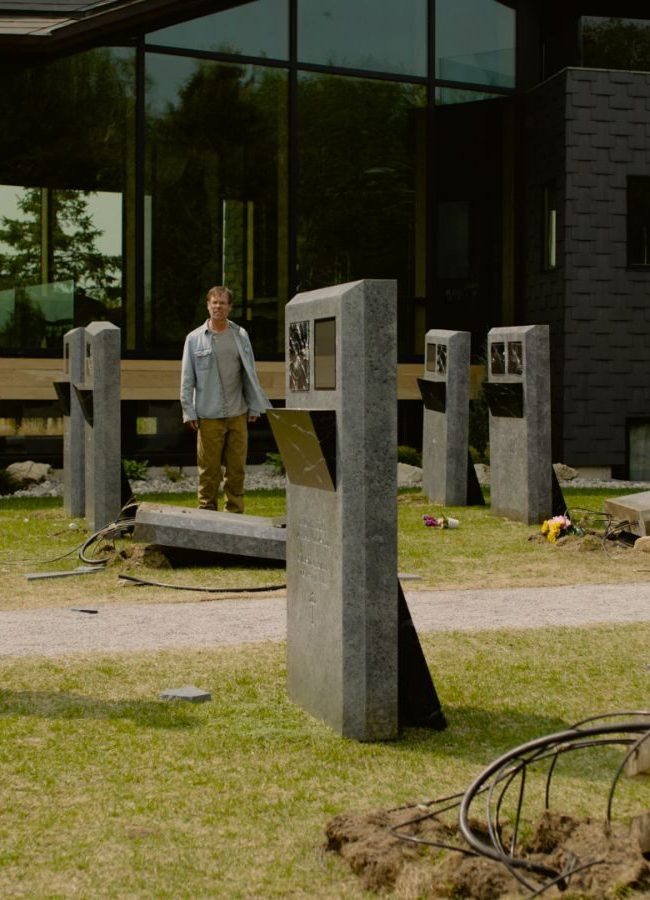
(Shame is distributed by Fox Searchlight. It opens theatrically on Friday, December 2, 2011. Visit the film’s official website to learn more.)
Steve McQueen’s follow-up to one of the most astonishing cinematic debuts in recent memory is just as interested as 2008’s Hunger in the collision of the physical and the psychological, of how the fluttering of the mind drives and punishes the body. McQueen’s preoccupation with the body, whether visually manifested (the camera carefully dissecting Michael Fassbender’s physique) or implied, resides not too far from David Cronenberg on the cinematic continuum of body-horror.
The basic thrust of Shame is quite simple. Brandon (Fassbender) is a sex addict whose obsession gets worse once his estranged younger sister Sissy (Carey Mulligan) comes to stay with him in New York. Little is revealed about the past of these two characters, other than that they are from Jersey and shared a rough upbringing, the specifics of which remain opaque. So there are no easy trappings with which to psychologize or explain away Brandon’s nature—which is not to say that rational conjectures can’t be made. The film’s main concern is with watching the implosion of a human being at his own behest.
 Sex is what drives Brandon’s life. He can’t so much take a ride on a subway without turning it into a game of seduction. There’s something almost vampiric about the way he lustfully gazes at the girl sitting across the way from him, as if trying to hypnotize her into being his next victim. And his relationship with his sister suggests psychosexual stirrings. Hearing her having sex with his boss is unbearable, causing him to flee his apartment in the middle of the night for one of the film’s most show-stopping scenes: a minutes long tracking shot of him running through the city. Brandon has issues with real intimacy and relationships. As he explains in a rather stale monologue to Marianne (Nicole Beharie), a co-worker he’s on a date with—a woman, who, for a glimmer of a moment it seems like he could have a real future with—he hasn’t had a relationship that’s lasted longer than four months and doesn’t see the point of marriage.
Sex is what drives Brandon’s life. He can’t so much take a ride on a subway without turning it into a game of seduction. There’s something almost vampiric about the way he lustfully gazes at the girl sitting across the way from him, as if trying to hypnotize her into being his next victim. And his relationship with his sister suggests psychosexual stirrings. Hearing her having sex with his boss is unbearable, causing him to flee his apartment in the middle of the night for one of the film’s most show-stopping scenes: a minutes long tracking shot of him running through the city. Brandon has issues with real intimacy and relationships. As he explains in a rather stale monologue to Marianne (Nicole Beharie), a co-worker he’s on a date with—a woman, who, for a glimmer of a moment it seems like he could have a real future with—he hasn’t had a relationship that’s lasted longer than four months and doesn’t see the point of marriage.
Hunger revealed McQueen as a formalist and here he has the entire canvas of New York City and all of its lights and shadows to work with. As Brandon and Nicole take a walk after their dinner the streets are cast in darkness, turning their figures into shadowy velvet outlines as the camera follows them down the sidewalk. And McQueen has an uncanny eye for capturing the burning multi-colored lights of a city in the same magical way that Michael Mann does.
 A few of the conversations (significantly two between Brandon and Sissy) are filmed as long-shot medium close-ups of the backs of people’s heads, paradoxically balancing both the great intimacy of physical proximity between them/their closeness to the camera and the unceasing barbs which threaten to rupture the surface of any conversation. For them to speak head-on with one another would mean for Brandon to face who he is, who he has become, and to allow for there to be a relationship between him and a women (be it his sister or otherwise) that doesn’t end with a fuck. But his sexual gluttony is like a lawn sprinkler spraying helter skelter in all directions.
A few of the conversations (significantly two between Brandon and Sissy) are filmed as long-shot medium close-ups of the backs of people’s heads, paradoxically balancing both the great intimacy of physical proximity between them/their closeness to the camera and the unceasing barbs which threaten to rupture the surface of any conversation. For them to speak head-on with one another would mean for Brandon to face who he is, who he has become, and to allow for there to be a relationship between him and a women (be it his sister or otherwise) that doesn’t end with a fuck. But his sexual gluttony is like a lawn sprinkler spraying helter skelter in all directions.
The film’s biggest flaw is the way in which it structures Brandon’s relationship with Sissy, which is supposed to be the emotional fulcrum of this movie. She’s a singer, and early on in the film Brandon goes to hear her perform at a restaurant where she sings “New York, New York.” The scene is clearly meant to be emotionally affecting, as Brandon starts tearing up, and Mulligan’s face quietly wells with emotion as she sings “These little town blues, are melting away / I’ll make a brand new start of it in old New York / If I can make it there, I’ll make it anywhere / It’s up to you New York, New York,” but at this stage in the film we know precious little about the dynamics of their damaged relationship so the would-be catharsis of this scene, had it been played later in the film, is not felt. What should have been the end of the film is the vertigo spiral to rock bottom despair set to Harry Escott’s searing score in which Brandon seeks out sex with a reckless pain and abandon that’s cringing and painful to watch. But it is followed by a certain event involving Sissy that is unnecessarily over-the-top in dramatics. Shame has some issues, but that does not preclude it from being one of the best in a year that has been overwhelmingly rich in astounding cinema.
— Veronika Ferdman











